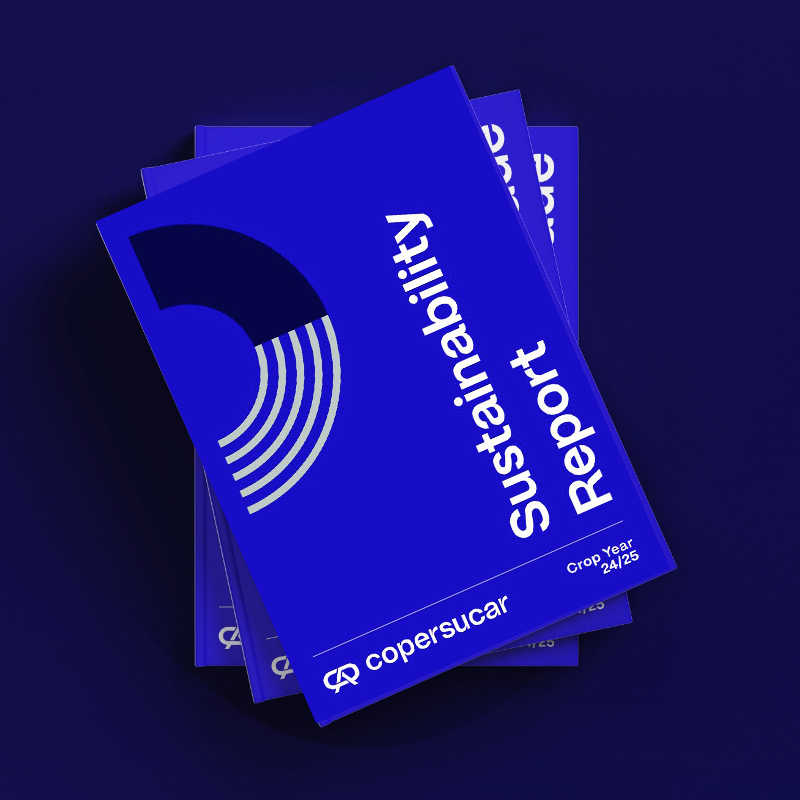
Copersucar’s 24/25 Sustainability Report Highlights Progress in the use of biomethane in Industry and Transportation
Ethanol’s contribution to decarbonization reached new heights this season, with record sales volumes in Brazil and the United States
Key Highlights:
- For the first time, Copersucar included the use of biomethane in its greenhouse gas (GHG) emissions inventory, avoiding over 4,000 tCO₂eq and replacing 2 million liters of diesel in industrial and transportation operations.
- The use of ethanol pipelines prevented the circulation of over 100,000 trucks in urban areas, avoiding 87,000 tCO₂eq.
- The expansion of rail transport for sugar distribution reduced emissions by 53,000 tCO₂eq.
- Ethanol commercialization avoided CO₂ emissions equivalent to the annual gasoline consumption of one-third of Brazil’s light vehicle fleet.
- Copersucar issued 6 million CBIOs, representing the reduction of 6 million tCO₂eq, a clear sign of progress in the sustainable production of its partner mills.
- Associated mills generated 6,700 GWh of biomass-based electricity — enough to power a city the size of Rotterdam, the Netherlands.
- Social impact: with more than 150 social projects in 337 municipalities, the Copersucar Ecosystem benefited over 430,000 people in Brazil.
- Food security: as the world’s largest sugar trader, Copersucar contributed to the nourishment of approximately 630 million people per year across 70 countries.
São Paulo, August 20, 2025 – Copersucar, an ecosystem offering renewable energy and natural food solutions, and a global leader in sugar and ethanol trading, has released its 24/25 Sustainability Report.
As a benchmark in the implementation of low-carbon and high-impact social production processes, the Copersucar Ecosystem leads in providing products that decarbonize the transportation, power generation, and industrial sectors.
For the first time, the report highlights the benefits of using biomethane to replace diesel in both industrial operations and logistics. Biomethane, a purified renewable gas produced by bacteria that metabolize organic residues from sugar and ethanol production (such as filter cake and vinasse), can reduce up to 90% of GHG emissions compared to diesel or natural gas. It can also be used for renewable electricity generation.
During the 24/25 crop year, the use of biomethane avoided the consumption of 2 million liters of diesel and reduced emissions by more than 4,000 tCO₂eq. A leading example in biomethane production and use, Cocal, a Copersucar partner mill, began producing biomethane in 2021 and operates one of the first industrial-scale plants in Brazil, with a capacity of 25,000 m³ per day. In 2024/25, using biomethane in its fleet replaced 720,000 liters of diesel and avoided 1,900 tCO₂eq in emissions. The byproduct from the process is reused as a biofertilizer, supplying 95% of the mill’s agricultural area.
Complementing its efforts to decarbonize logistics, Copersucar continues to invest in pipeline and rail transport. The use of ethanol pipelines during the season removed more than 100,000 trucks from urban roads, while rail transport for sugar shipments reduced 53,000 tCO₂eq in emissions — contributing to lower CO₂ emissions and improved urban mobility.
Copersucar also achieved record ethanol sales in Brazil and the United States during the 24/25 season. The traded volume avoided over 26 million tCO₂eq, equivalent to the annual gasoline consumption of 12.5 million cars, or about one-third of Brazil’s light vehicle fleet.
Additionally, 6 million CBIOs were issued — equivalent to 6 million tCO₂eq avoided, a 16% increase compared to the previous season, reaffirming the ecosystem’s progress toward sustainable production.
Partner mills generated 6,700 GWh of electricity from biomass, enough to supply a city the size of Rotterdam.
Considering Scopes 1 and 2 emissions, the Copersucar Ecosystem recorded 0.4569 tCO₂eq per ton of product traded in 24/25. Since 2023, the company has strengthened its monitoring and management of indirect (Scope 3) emissions, with initiatives such as replacing synthetic inputs with biofertilizers, adopting regenerative agriculture practices, and switching from fossil to renewable fuels — all contributing to increased CO₂ sequestration in the field.
On the social front, the ecosystem invested approximately R$ 12 million in more than 150 projects, benefiting 430,000 people in local communities. These initiatives prioritize education, focusing on sports education, sustainability education, and citizenship development to promote local growth.
Copersucar also plays a key role in global food security, as its sugar trading activity contributes to feeding approximately 630 million people per year in over 70 countries.
“We are fully aware of the significant impact of our low-carbon product portfolio and the responsibility that comes with it. We remain committed to expanding this impact through continuous initiatives and investments. This is a journey that combines growth, value creation, and positive impact — building new frontiers for our business and for a low-carbon economy,”
said Tomás Manzano, CEO of Copersucar.
These and other results are detailed in the 24/25 Sustainability Report, which will now be published annually. The document includes Copersucar’s annual GHG inventory, certified for the eighth consecutive year with the Gold Seal from Fundação Getulio Vargas’ Public Emissions Registry.
Access the full report: https://relatorios.copersucar.com.br/2025/english.html
